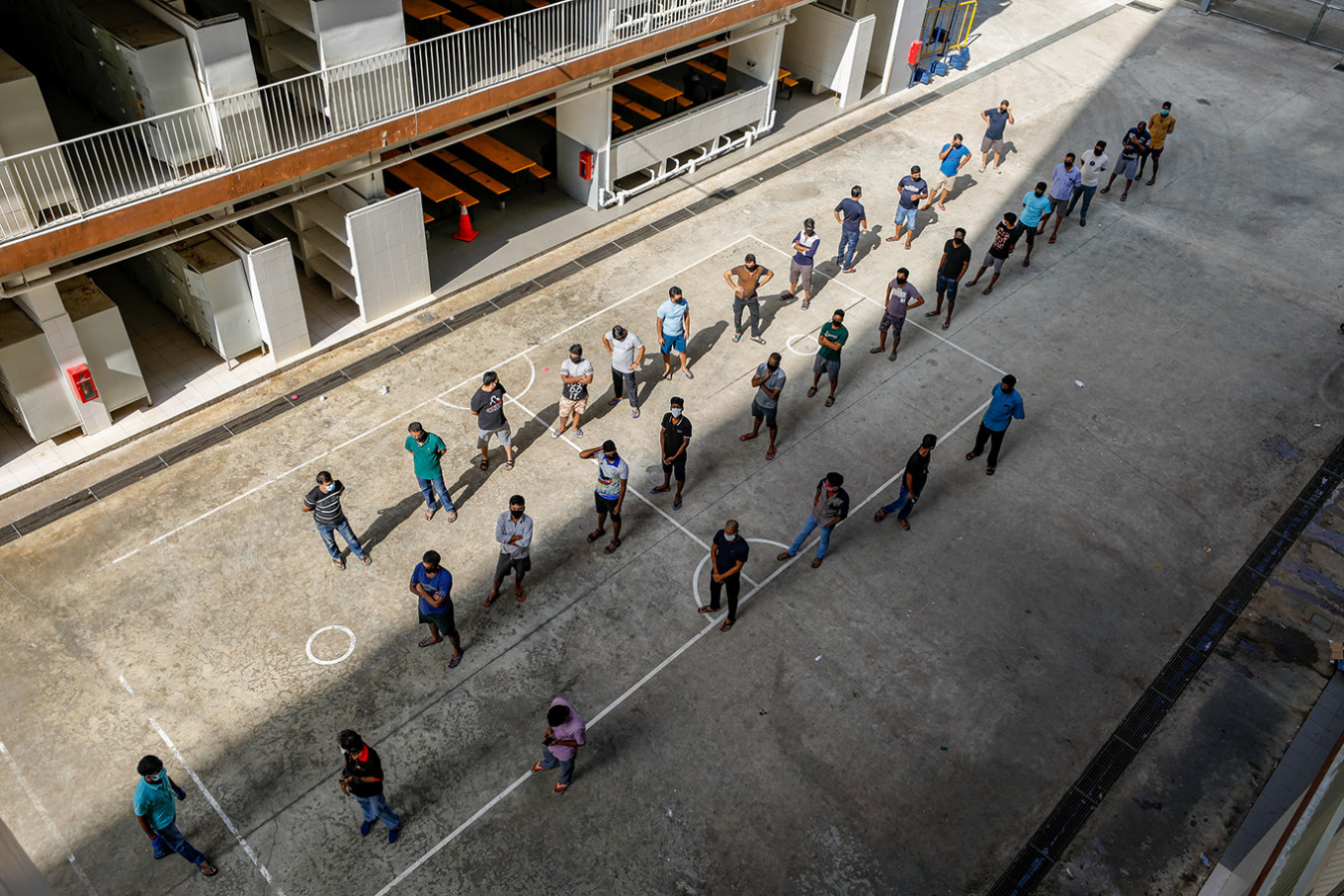Popular Reads
Top Results
Can't find what you're looking for?
View all search resultsPopular Reads
Top Results
Can't find what you're looking for?
View all search resultsLong road to removal of migrant worker placement costs
The existing system should change gradually and a clear-cut cost structure is needed.
Change text size
Gift Premium Articles
to Anyone
I
ndonesian migrant workers, dubbed foreign exchange heroes and heroines at home, have had to bear all their own predeparture costs. The decades-long scheme will be annulled by Article 30 (1) of Law No. 18/2017 on the protection of Indonesian foreign workers, changing the whole chain of the employment process.
The existing system should change gradually and a clear-cut cost structure is needed. The new arrangement should be communicated properly and clearly stated in the agreements and working contract.
The article stipulates that “Indonesian migrant workers [TKI] shall not be charged with placement costs”, but when the Agency for the Protection of Indonesian Migrant Workers issued a regulation to implement the article in August last year, employers reacted strongly.
Hong Kong agencies argued that the new policy would make hiring domestic helpers from Indonesia too expensive (South China Morning Post, Sept. 27, 2020). Taiwanese employers have also refused to cover the recruitment costs for TKI and will consider bringing in migrant workers from other countries instead (CNA, Nov. 11, 2020). Singaporeans say that hiring Indonesian maids will be more expensive, and they have no choice but to look for alternatives elsewhere (The Strait Times, Dec 18, 2020).
Efforts to protect migrant workers should continue through better coordination. In this regard, at least, there are three salient points that can be initiated: streamline and speed-up the process, set a clear-cut cost structure and design appropriate communication with related parties both in Indonesia and destination countries.
Typically, migrant worker placement is based on three accords: an agreement between the Indonesian agency and its counterpart in the destination country, an agreement between the Indonesian agency and TKIs, and a contract between the employer and TKI.
So far, private agencies pay all of the migrant workers’ predeparture costs in advance. Some agencies provide training and incur all expenditures throughout the predeparture period on the TKI. It is common practice for predeparture to be arranged by individuals acting as agency staff. On the other side, the arrangement in the destination country also involves a local agency that is permitted to collect a fee.
At the end, all costs have to be paid by the TKI through a deduction of his/her salary for months, based on a tacit agreement. Such arrangements have been in place for decades. The longer the chain of preemployment, the higher the costs. And the higher the cost, the longer the worker’s salary has to be deducted. This complicated and long process generates overcharging and entraps workers into an indebted situation.
Basically, there are five components in the preemployment phase: training and certification, documents, medical check-up, transportation and arrangements in the destination country. Consequently, there should be clear divisions of responsibility. The Indonesian government certainly can provide training and certification by utilizing skill training centers that are available in almost every provincial capital and big cities.
An employer is responsible for some portion of the costs to acquire a migrant worker, such as return tickets, visa and working permit, insurance, medical check-ups and agency fee in the destination country, and other legitimate fees determined by the local government of the TKI’s place of origin.
To incentivize people to become migrant workers, Indonesian agencies can cover personal needs like passports, medical check-ups in Indonesia, local transportation at the training center and social security schemes. The agencies can later deduct the workers’ salary for let’s say one month, and this reimbursement should be clearly stated in the agreement and working contract.
To ease migrant workers’ burden, however, the government can provide support such as free passports and medical check-ups in public health facilities.
The new arrangement for migrant workers’ placement should be simpler and faster, generate more skillful TKIs, set a clear-cut cost structure and be communicated to all parties concerned. Failure to meet those requirements will not only cost the migrant workers their competitiveness but also tempt them to seek an illegal path.
Most TKIs are domestic workers in Hong Kong, Taipei, Singapore, Brunei Darussalam, Malaysia and Middle Eastern countries. The second group of TKIs is employed in the manufacturing sector in South Korea, Taipei and Malaysia; the third comprise those who work in construction in Malaysia and Middle Eastern countries; the fourth group is made up of workers in the palm oil plantation industry in Malaysia, the fifth group represents a few thousand caregivers in Japan; and the sixth group is Indonesian seafarers employed by foreign cruises and fishing vessels.
Several destination countries have signed memorandums of understanding (MoU) with Indonesia that include the countries’ commitment to the protection of migrant workers.
Article 30 of the Migrant Worker Protection Law can be implemented in stages, starting from domestic helpers and those in the fishing sector. The International Labour Organization Convention 189 stipulates that domestic helpers are among the most vulnerable groups; therefore, they are entitled to decent work and treatment.
The Work in Fishing Convention No. 188/2007 by the ILO recognizes that the fishing sector includes one of the most challenging and hazardous occupations. The ILO and like-minded countries continue to improve workers’ employment conditions and ensure decent work. The convention also aims to maintain sustainability in the fishing industry and fight illegal, unregulated and unreported fishing.
Finally, free placement arrangements for TKIs should be clearly stated in agreements and working contracts and legalized by a public notary in the destination country.
***
The writer is the deputy chief of mission at the Indonesian Embassy in Singapore.










